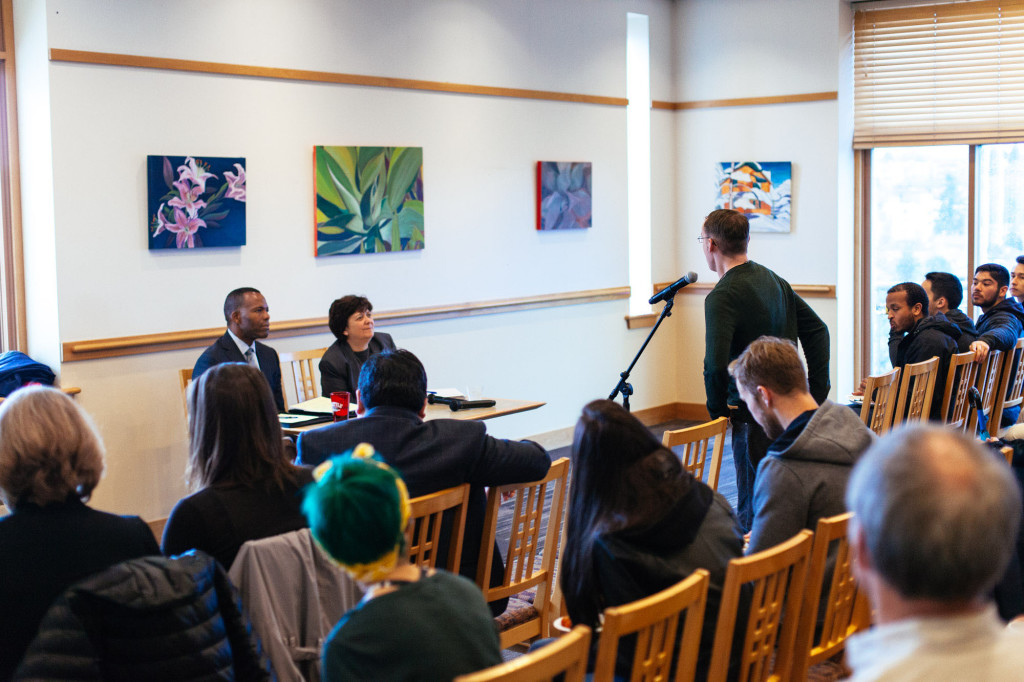While most students on campus agree that the Disabilities Services office does excellent work, a pivotal problem is the lack of funding for the department to hire enough staff to accommodate students. A forum held yesterday to address this issue seems to have gone well.
Dozens of students who utilize Seattle University’s Office of Disabilities Services gathered in the Casey Commons to advocate for the hiring of a new staff member for the department.

Provost Crawford reminded the audience the goal of the panel: to determine how an additional staff member at the Disabilities Services office would positively
impact students.
“The forum’s intention is just to get as many students, faculty and staff to come as a show of support for why we as students feel it’s important in this budget year that we fund some kind of support for Disabilities Services, ideally with a new staff member,” said sophomore SGSU Students with Disabilities Representative, Braden Wild.
The office is available to students with all kinds of disabilities and provides services anywhere from finding mobility accommodations to changing meal plans to conducting tests for students who require low distractions or extra time. As the number of students requesting their services increases drastically, the staff of four is taking on more and more responsibility without any extra help.
Coalition for Students with Disabilities organized yesterday’s forum and Wild facilitated it. Provost Isiaah Crawford and Chief Financial Officer Connie Kanter were both present to hear what the students had to say.
“The key here is that by sharing individual students’ experiences beyond my own voice or beyond the Coalition’s voice, hopefully it’ll reinforce why it’s so important,” Wild said.
The Coalition chose to speak directly to Crawford and Kanter because they felt the two individuals are able to make the most impact in this situation. As the CFO, Kanter is in charge of the budget, so her support could determine whether funding for a new staff member is allocated to Disabilities Services in the new fiscal year. As for Crawford, Disabilities Services falls under his purview as a cabinet member, and he can influence how much weight is put on this issue as the cabinet makes budget decisions.
At the forum, students sat in chairs facing Crawford and Kanter, who sat at a table in the front of the room. After a brief introduction from Wild, anyone was able to come up to the microphone and share an experience, ask a question, or make a suggestion. Everyone who spoke clearly felt that the current staff members at Disabilities Services do excellent work; the problem most identified is that there are too few of them to adequately meet the needs of the growing population of students requesting their services.
“The biggest challenge they have revolves around staffing making it harder for individualized support, which for these students makes or breaks whether they get the right accommodation,” Wild said.
At the forum, one student said that the lack of staff causes delays in appointments, and in a 10-week quarter any delay has a significant impact on the student’s overall performance in class.
“We’ve talked to other schools to see what they do, and there’s a big range in the comparison, but generally they have more staff and more space. And a lot of times they have more staff and are serving fewer students,” said Disabilities Services Office Manager Candace Bohonik, one of the four permanent staff members in the office.
According to Bohonik, the numbers of students they serve is continually increasing. At the beginning of the academic year in July, they had 770 students registered, and now the number has risen to 1,030 students. Director Richard Okamoto, who handles the intake of new students among other things, is currently serving an average of 14 new students per week. This intake meeting process alone takes an hour per student, and Okamoto is also dedicated to working with registered students who may need to check in or change their accommodations.
On Friday, the cabinet began accepting budget requests for the upcoming fiscal year, and among them was a formal request from Disabilities Services for the cabinet to approve funding for a new position, Associate Director of the Office of Disabilities Services.
“It had an array of different responsibilities, but a significant component of it is geared towards professional development and training of faculty and broader university staff to help engage students with disabilities concerns,” Crawford said after the forum.
Though Crawford and Kanter have been aware of the issue and meeting with Wild to talk over the budget for a while, they appreciated hearing individual students’ perspectives.
“When you put a face on any issue, it makes a huge difference, so I think it was really helpful to hear from students,” Kanter said. “One thing that particularly touched me was the number of students who noted how difficult it was for them to stand up and speak on these issues. I really appreciate the openness.”
The cabinet will have two meetings later this month to develop the budget, which they will submit to the Finance Committee in mid-April. It will be approved by the board in the first week of May.
“We’re always in this position of having great needs and great ideas, but not enough money to fund everything. So if we do this, we’re going to have to not do something else,” Crawford said.
That said, he supports the proposal. “I’m going to advocate for it very strongly in the budget development process, and I’m assuming it’s going to go well.”
Madeline may be reached at mcorbin@su-spectator.com








